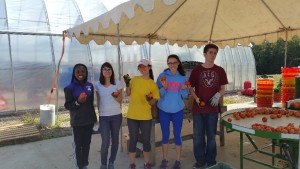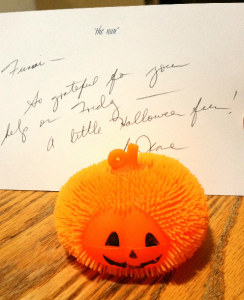Reflections on the Poverty Simulation by Lillie Reder
The main reason I applied to be a CBL Intern was to express to my classmates and friends how crucial it is to incorporate yourself into the larger community when trying to gain a better understanding of the mechanisms of our society, and how they influence the day-to-day functions of our lives. Working closely with the Donelan Office provided many opportunities that I would not have known about otherwise.
The first opportunity that I was able to take advantage of was an intensive poverty simulation brought to Holy Cross by the Office of Multicultural Education and the Missouri Association for Community Action. At first I thought it would be a fun exercise that would shed some light on the daily struggles people in poverty suffer, but after an hour of training I realized it was no game or minor exercise!
During training I learned the breakdown of the hour long simulation, which went, in a very simplified manner, as follows:
♦Everyone is assigned a persona, with detailed descriptions including age, gender, other family members, recent employment standings, current financial standings, weekly responsibilities, and whether or not they are affiliated with another family in some way (ie: one teenager was carrying the child of another family member in the simulation).
♦Families sat down together to debrief and figure out all the payments that needed to be made during a regular week and who needed to be where at what times in terms of school or work.
♦After a ten minute period of getting familiarized with your family, the first week began. “Weeks” consisted of 15 minute time slots where families had to run around the room to different stations that represented a variety of facilities like a pawn Shop, the bank, a mortgage collector, social services, etc. At each facility participants had to give bus passes, and if they didn’t they would have to go to the Quick Mart to buy one before they could complete their necessary errands.
♦The families would have two minutes, which represented the weekend, to rest before the next week would start and they would have to complete all of their tasks again. Sometimes if they were not able to complete tasks on time, the volunteers, or workers would go around and fine them, or on some occasions evict them from their homes.
♦Not only did the families have to worry about the list of tasks they were assigned to accomplish, but they also had to be weary of the “Luck of the Draw” cards that were randomly handed out and brought either good or bad news, which in the end would always add stress to the busy “weeks.”
Overall the simulation was very powerful to watch, I personified the mortgage banker and collected everyone who rented homes, monthly rent or mortgage payments. When families did not pay within the first two weeks of the month, I was forced to give them notices, and if they still were unable to pay by the third week I had the power to evict them from their homes. Although I was obviously reluctant to do this, I wouldn’t have a job if I didn’t and would then have been in the same position they were in.
Every participant that I encountered by the end of the third week was run down and frustrated because things did not always go their way; they would miscount their money, not have enough, and get even so stressed about obtaining more money they would at times resort to stealing from other families or properties. Although it was only an hour long simulation, by the end everyone was beat and really feeling an emotional and physical toll on their bodies. The stress and frustration that permeated the room eventually diffused after the last whistle was blown signifying the end of the simulation. We all knew, however, that in real life a whistle doesn’t just blow and everything turns right again. The last hour we had all just spent together, feeling at times defeated is how many people feel every day. It is hard to truly express how much the simulation affected me—everyone should take advantage of this opportunity and discover their own reaction to poverty!
Everyone took away something different from the simulation because all of our experiences were different. We weren’t all the same families with the same handicaps or advantages which made for a more versatile and at times overwhelming experience. I am more than excited to partake in the next Poverty Simulation in November and hope for a larger turnout than our first one. The understanding you walk away with, especially being a student at Holy Cross, opens your eyes to what is happening outside our gates and provokes a desire to do something to change it for the better.
Lastly, I just wanted to note the amount of student volunteers that had their own encounters with poverty. I learned a lot about different organizations that helped them when their families were in tough situations or instances where they had to use the same facilities we had represented in the simulation. A lot of the associations prevalent today really help families in need, and hearing how my classmates were affected by these groups really brought a new perspective to them. I think a lot of times people, myself included, recognize that certain organizations or groups do good for society and our communities, but neglect to further understand why or how they provide such positive outcomes. If more people understood how these organizations work to alleviate poverty we may be able to better capitalize on what they are doing right, and in the long run, find a solution to these problems.



